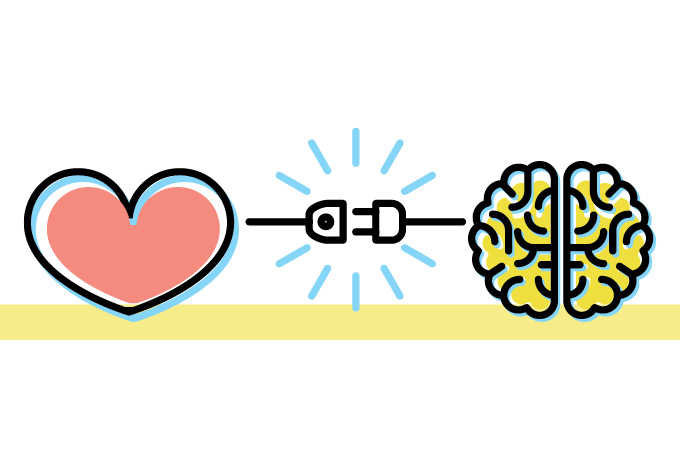Our brains and bodies are deeply connected, so it’s not surprising that emotion and stress can have just as much of an impact on cardiovascular health as diet and exercise. Helpful stress (eustress) may allow you to improve mental focus and get things done, but the unhelpful kind (distress) can contribute to heart disease, so it’s important to keep the two in balance.
the physical side
“You are what you eat.” The old adage has special significance for heart health. Diet has a profound effect on your body, so choosing certain types of foods (and avoiding others) can impact how well your cardiovascular system functions, says cardiologist Dr. Lauren Munsch dal Farra, CEO of PALM Health. She says it’s especially important to stay away from foods that cause inflammation in body tissues, including the heart and blood vessels. This means nothing highly refined or processed, overly greasy or highly sweetened, or containing a lot of artificial ingredients.
Dal Farra says harmful foods spur the release of cytokines, or inflammatory messengers, in the body and kick off the process of fatty plaque buildup in the arteries, which leads to heart disease. On the flip side, there are plenty of highly nutritious foods that support good heart health and should have a permanent place on your daily menu, according to dal Farra.
what to eat:
- Fresh, highly colored produce like leafy greens, vegetables and fruits
- Whole grains
- Plant-based proteins like those in nuts and legumes
- Fresh herbs, spices and other natural seasonings in place of salt
- Cooking oils like avocado, coconut or rice bran that have a high smoke point (temperature at which they can become toxic)
- Olive oil for tossing in salads
what not to eat:
- Whole butter and milk, which contain higher levels of saturated fats
- Processed meats like hot dogs
- Foods containing white sugar and white flour, which are not nutrient-dense
- Foods high in saturated fat
- Cooking oils like corn or canola, which have a low smoke point
other tips for heart heath
Washington University cardiologist Dr. Justin Sadhu says keeping your heart healthy means staying in tune with your whole body. The best way to do that? Visit your doctor regularly and be aware of key vital signs and health factors.
- Know your blood pressure. The lowest cardiovascular disease risk is seen in people who have blood pressure of around 115/75, and each incremental increase can mean a higher risk of disease, according to Sadhu. “Consult your doctor to find out if your blood pressure is at a level where it needs to be treated,” he advises.
- Be aware of blood sugars. Diabetes can have an effect on heart health. “Know your blood sugar levels and talk to your doctor about treatment if it’s needed,” Sadhu says.
- Know your BMI. Body mass index (BMI) is a measure of adult body fat based on height and weight, and it can help doctors gauge whether a patient is at a healthy weight. “About one-third of Americans are overweight, and another third are obese,” Sadhu explains. “These numbers have gone up dramatically in the last 10 years.” (18.5 to 25 is considered a healthy BMI range.)
- Keep your activity consistent. Physical inactivity is an important risk factor. “Adults should get 150 to 300 minutes of moderate exercise like brisk walking each week, or 75 to 150 minutes of vigorous activity like jogging or running,” Sadhu says.
the emotional side
SLUCare cardiologist Dr. Lisa Alderson says mental health can have a profound effect on heart health. “One of the most striking examples we see is ‘broken heart syndrome,’ a condition that can appear when the patient has an extreme stress like the loss of a family member,” she says. “The person may experience acute chest pain similar to a heart attack. Whatever the stressor is, doctors think the syndrome may be related to adrenalin surging through the body.”
Alderson says stress, loneliness, depression and negative emotions in general can impact cardiovascular health, whether they are sudden or long-lasting. “We don’t yet have a good handle on exactly how different types of emotions like shock, fear or anger specifically affect the heart, but we know they do,” she notes. “Everything in the human body is interconnected, so whatever helpful things you can do for your body will be good for your mind, and vice versa.”
Dal Farra says managing stress for better health may sound like a difficult task in the midst of our busy schedules, but it can be accomplished. “One way we advise patients to reduce stress is by building meaning and purpose into their lives,” she notes. “Feeling more fulfilled in our daily activities can be achieved not just by removing negative experiences but by adding positive ones that help us understand ourselves better. Everything we do in terms of prevention and healing has a dual mind/body aspect. You can’t separate mental health from physical health.”
emotions & stress impact your heart
- Studies have suggested that sudden stress leads to oxygen deprivation and abnormal heart rhythms, even if you don’t already have heart disease.
- If you do have cardiovascular disease, strong emotions such as anger may contribute to serious, irregular heart rhythms.
- Depression also can increase risk for heart-related events.
Source: Harvard Health Blog
postive daily practices
- Meditation
- Mindfulness
- Breathing exercises
- Relaxation
- Healthy sleep
- Acts of kindness
